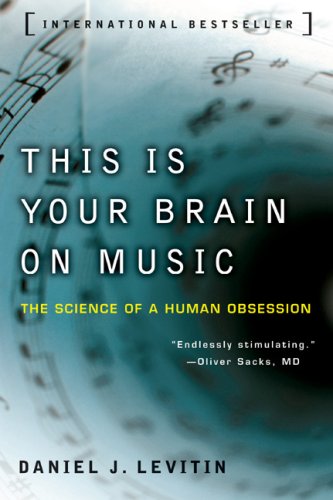It was suggested to me that I should take a look at Daniel Levitin's "This Is Your Brain on Music." After finding it, I sat down and read the introduction of it, and from just those few pages, I have gleaned some very fascinating information that I would like to share here now.
First, Daniel makes a very good point about the difference between science and music. Is there actually much of a difference between it? "Most artists describe there work as experiments (Levitin, 4)." This is a very true statement that Levitin brings up. There's even a process that seems to be similar to scientists and musicians alike. They both have an idea, they do research on it, then a trial run, and if it actually works, they proceed to produce something out of it. If people could actually see this connection, then the mathematically inclined and artistic minded could somehow find an easier common ground.
Second, he talks about how the perception of music in Western Society has changed over the past several hundred years. It used to be that everyone participated in creating music. Before radio, families would sit around and create music for themselves as just a mere form of entertainment. Just by simply playing and singing did not mean that you were a professional or were trying to be. You were just having fun. What is truly fascinating about this is the example that Levitin pointed out with a friend of his, Jim Ferguson.
"For his doctoral degree at Harvard, he performed fieldwork in Lesotho, a small nation completely surrounded by South Africa. There, studying and interacting with local villagers, Jim pa- tiently earned their trust until one day he was asked to join in one of their songs. So, typically, when asked to sing with these Sotho villagers, Jim said in a soft voice, “I don’t sing,” and it was true: We had been in high school band together and although he was an excellent oboe player, he couldn’t carry a tune in a bucket. The villagers found his objection puzzling and inexplicable. The Sotho consider singing an ordinary, everyday activity performed by everyone, young and old, men and women, not an activity reserved for a special few." (6)How interesting is that? I had never considered that to even be a possibility, that somewhere in the world, you could simply break out into song and no one would judge you as bad or good, you were just expressing yourself. However, as amazing as that sounds, I am not sure I would want to live there. I enjoy knowing what is good and what is bad to me. It gives what I love a special significance. But how much should we really know?
The third aspect I brought out of reading the introductory, was his addressing of a concern that I have had in the past as well. What if I learn so much about musical theory and history, that it loses that special meaning it has to me? But apparently, Levitin's students have also expressed the same concern that it will, "Steal away many of life's simple pleasures (10)." But Daniel has said that in his experience, it can't. Science raises just as many questions as it answers, and so does music. If anything, it will deepen your appreciation of it, because it broadens your knowledge of what to look for, and therefore, what you appreciate and enjoy.
From jut reading this introduction, I am inclined to read the rest of it and see what all he has to say. Now I just have to find the time to do it. There is never enough time. Even Darth Vader agrees.
http://nooooooooooooooo.com/

Levitin is an interesting fellow, sometimes a bit verbose but his ideas are interesting. I did push the button!
ReplyDelete